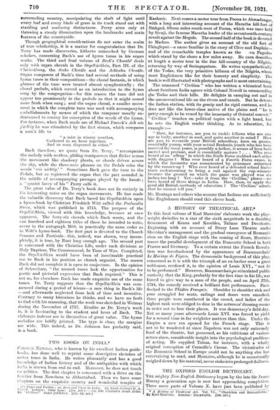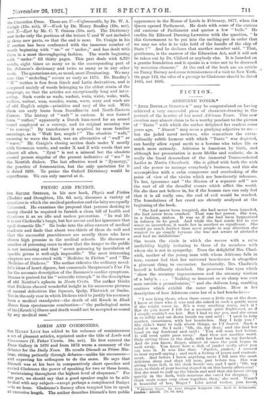THE OXFORD ENGLISH DICTIONARY. THE mighty New English Dictionary begun
by the late Sir James Murray a generation ago is now fast approaching completion. Three more parts of Volume X. have just been published by • A History of Theatrical Art. Vol. VI., " Classicism and Itomantkism." Sy Karl Mantzlus. London; Duckworth. 1285. net.]
the Clarendon Press. These are U—Unforeseeable, by Dr. W. A. Craigie (15s. net), W—Wash by Dr. Henry Bradley (10s. net), and X—Zyxt by Mr. C. T. Onions (108. net). The Dictionary now lacks only the portions of the letters U and W not included in these new parts, so that the end is near. Dr. Craigie in his L' section has been confronted with the immense number of words beginning with " un-" or " under.," and has dealt with them in a most thoroughgoing fashion. The words beginning with " under-" fill thirty pages. This part deals with 6,220 words, eight times as many as in the corresponding part of Dr. Johnson's dictionary and twice as many as in any other work. The quotations are, as usual, most illuminating. We may note that " underling " occurs as early as 1175. Dr. Bradley's " W " section is free from Greek and Latin derivatives, and is composed mainly of words belonging to the oldest strata of the language, so that the articles are exceptionally long and inter- esting. Such words as wade, wadset, wain, waist, wake, walk, wallow, walnut, wan, wander, warm, warn, wary and wash are of old English origin—primitive and racy of the soil. With them are early loans from Scandinavia and North-Eastern France. The history of " waft " is curious. It was formed from " wafter," apparently a Dutch loan-word for an armed vessel employed as a convoy, and its original meaning was " to convoy." By transference it acquired its more familiar meanings, as in " Wait her, angels ! " The obsolete " waft," meaning to wave the hand, was an alternative of " waff " or " wave." Mr. Craigie's closing section deals under Y mostly with Germanic words, and under X and Z with words that are almost all alien. " Zyxt " is not a mineral but the obsolete second person singular of the present indicative of " see " in the Kentish dialect. The last effective word is " Zymurgy," the practice of fermentation, but the only quotation for it is dated 1868. To praise the Oxford Dictionary would be superfluous. We can only marvel at it.











































 Previous page
Previous page